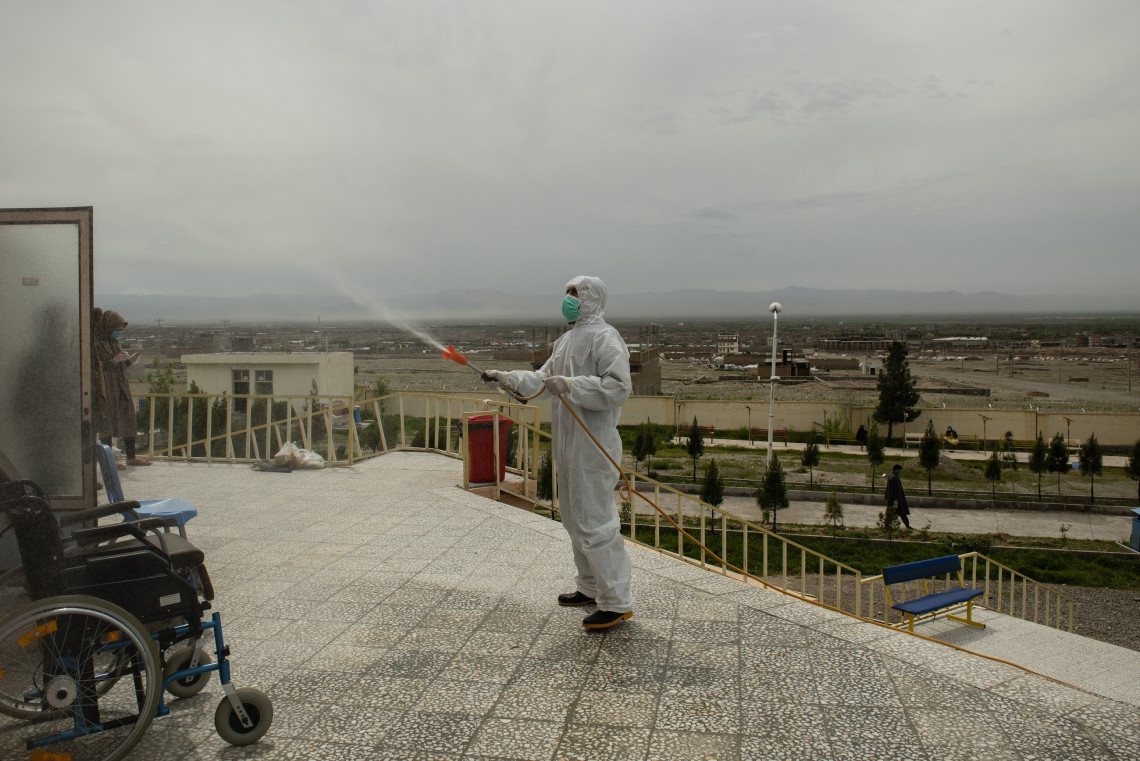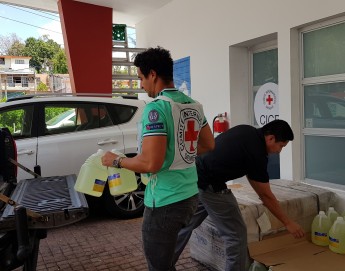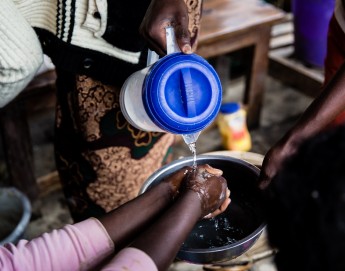
COVID-19 appeal: None of us are safe until we're all safe
COVID-19 is a global crisis that requires a global response. This pandemic threatens every aspect of people's lives, amplifying inequalities and destabilizing communities. To increase life-saving services and support to address the immediate impacts of the pandemic and its long-lasting social and economic repercussions, the International Red Cross and Red Crescent Movement, on Thursday, made a collective appeal for 3.1 billion Swiss francs (3.19 billion US dollars).
From mental health support, medical aid, or livelihood assistance in conflict zones, the ICRC is working together with National Red Cross and Red Crescent Societies to ensure that we assist now and beyond the pandemic's immediate effects to help the most vulnerable. We are asking for more financial support to be able to do that.
This pandemic is creating crisis-level needs that will endure long into the future, whether for mental health support, conflict zone medical aid or livelihood assistance. The ICRC is working hand in hand with the Red Cross Red Crescent Movement, at the intersection of the pandemic, armed conflict and violence to ensure that we assist both now and beyond the pandemic's immediate effects to help families in the long-run.
Our health response
In many areas affected by conflict and other violence, the ICRC-supported health structures are among the few functioning facilities. We are adapting and reinforcing our existing support to ensure continuity of critical health care throughout the pandemic. To help reduce the risk of contagion, we are focusing on bolstering the capacities of its supported facilities to implement infection and prevention control and sanitation measures and to detect the disease.
Mental health and psychosocial needs of people in conflict and violence-affected contexts are intensified by the effects of the COVID-19 crisis. The ICRC is adapting its programmes to ensure continued services, in addition to expanding our services to support front line workers. But we cannot do this alone.
Our work in detention facilities
Detainees are not exempt from society when it comes to infectious diseases. Detention facilities are often overcrowded, poorly ventilated and with deficient sanitary conditions; health services and washing facilities are not always readily accessible.
These factors favour the spread of disease and have catastrophic consequences in such environments, where the rate of transmission is potentially much higher than in other settings. The constant flow of people – detainees, staff and visitors – presents the additional risk of bringing the virus into places of detention or back out into mainstream society.
The ICRC has a unique role to play in protecting detainees and prison staff from the spread of COVID-19. In many places around the world, the ICRC has privileged access to places of detention, where it visits detainees to check on their well-being and works with the relevant authorities to address specific humanitarian needs, including access to water and health care.
In some cases, it implements technical interventions and supports reform processes aimed at improving detainees' treatment and living conditions. The ICRC works not only to mitigate the spread of the virus inside detention facilities but also to prevent it from being brought back into wider society where it could affect even more people.
None of us are safe until we're all safe.
— ICRC (@ICRC) May 28, 2020
COVID-19 is a global crisis that requires a global response.
We're launching an appeal with the @ifrc to help the world's most vulnerable countries prepare and respond: https://t.co/8QYewQwmb3
Access to water and sanitation
The lack of water and proper sanitation in many areas affected by conflict or other violence makes it difficult for people to practice basic infection control measures such as hand-washing. Hygiene conditions are especially poor in vulnerable low-resource communities and areas hosting displaced people, such as makeshift camps and migrant shelters.
In some cases, movement restrictions have resulted in limited access to food and other essential supplies, and the slowdown of economic activities has affected people's livelihoods, threatening their ability to meet their basic needs.
Together with local authorities and service providers, the ICRC is implementing projects to ensure that people have access to clean water and are able to maintain proper hygiene, in order to prevent the spread of COVID-19.
It is also giving emergency assistance to ensure decent living conditions for communities affected by movement restrictions, patients and medical staff at treatment or quarantine centres, and other particularly vulnerable groups.
Safe and dignified management of human remains
The number of deaths caused by COVID-19 may overwhelm local institutions and practitioners. A failure to adequately plan for mass-casualty situations risks people being buried in mass graves, causing suffering to families who may not know where their relatives are buried.
Containment measures may also include restrictions on funeral and burial practices, which may hinder families from practicing cultural or religious customs, exacerbating their grief.
The ICRC is adapting and increasing its support for the authorities and others involved in managing human remains, drawing on its experience from past emergencies, including the 2014–2015 Ebola outbreak in West Africa. Our focus is on reinforcing emergency preparedness and response capacities and ensuring that pathologists, morticians and other personnel are protected against the disease.
The ICRC has developed guidelines – and instructional videos and posters – on ensuring the dignity of the dead and of their families during the COVID-19 pandemic; it is also stepping up its engagement with the authorities, medicolegal agencies, forensic practitioners and other specialists, in coordination with the WHO and the International Federation. In some cases, the ICRC also supports upgrades to facilities used for human remains management.





